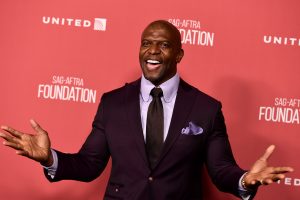Terry Crews And Male-On-Male Sexual Harassment
Are males who allege sexual assault or harassment treated differently than females who make similar allegations?

Terry Crews (Photo by Frazer Harrison/Getty Images)
The recent tidal wave of sexual harassment allegations against high-profile men has come almost exclusively from women. The glaring exception is Terry Crews, the 48-year-old actor and former NFL linebacker who’s accusing a well-connected Hollywood talent agent, Adam Venit, of groping him at a party in early 2016.
Crews initially came forward with his allegations via Twitter this past October. He initially did not name the alleged perpetrator. He’s since made various media appearances around the country to discuss his allegations publicly, eventually naming Venit. On December 4, he filed a lawsuit against Venit and his employer, William Morris Endeavor Entertainment (WME), arguably the most well-connected and powerful talent agency in Hollywood. Crews’s complaint says that WME (through agent Brad Slater) represented Crews at the time of the alleged incident.

Navigating Financial Success by Avoiding Common Pitfalls and Maximizing Firm Performance
According to the complaint (which you can read here), Crews attended “an entertainment industry event” at Hutchinson’s Restaurant in West Hollywood hosted by Adam Sandler on February 4, 2016. The complaint states that during the party Venit, who Crews had never met, began to stare at Crews intently, “like a rabid dog, sticking his tongue in and out of his mouth provocatively.”
Crews’s complaint alleges that when Venit approached Crews, “Venit reached his hand out as if to shake Crews’[s] hand . . . [but], instead, lunged towards Crews grabbing Crews’[s] genitals (penis and testicles), squeezing them so hard that Crews leapt back in pain.” The complaint asserts that despite shoving Venit away, Venit grabbed Crews’s genitals again and continued to try and do so over Crews’s protests. Crews claims that after alerting party host Adam Sandler about Venit’s conduct, Crews and his wife left the party after being there for about 30 minutes.
The complaint goes on to contend that Crews informed his agent of Venit’s conduct the next day. Crews states that he then received a telephone call a few hours later from Venit who apologized to Crews, allegedly saying that “he just was not himself that night.” Crews claims that he believed Venit was going to “held accountable” by WME for his conduct, but that he was not.
Crews’s lawsuit contains claims for sexual assault, battery, sexual battery, sexual harassment, gender violence, intentional infliction of emotional distress, breach of fiduciary duty, negligence, and negligent retention and supervision. He’s seeking multiple forms of damages including punitive damages. Crews also filed a police report with the Los Angeles Police Department.
Sponsored

Is The Future Of Law Distributed? Lessons From The Tech Adoption Curve

Early Adopters Of Legal AI Gaining Competitive Edge In Marketplace

Legal AI: 3 Steps Law Firms Should Take Now

Legal AI: 3 Steps Law Firms Should Take Now
WME publicly acknowledged that Venit was suspended for 30 days from his employment with the company in November 2017. In Crews’s media appearances and on social media, he’s said he feels like he isn’t being taken seriously given that Venit has not been fired from his agency or otherwise more seriously disciplined. Crews claims his allegations are being treated and viewed differently than those of recent female accusers.
Is Crews right? Are males who allege sexual assault or harassment treated differently than females who make similar allegations?
Some people are surprised to learn that civil rights laws do afford protections to men. For example, Title VII of the Civil Rights Act of 1964 protects men and women from sexual harassment in the workplace, regardless of the gender of the harasser.
In my experience, however, male-on-male harassment claims are generally more difficult to win than male-on-female harassment claims. Why? There are two separate reasons.
First, I’ve seen different societal norms and expectations applied to men in the workplace, especially in blue-collar jobs. Courts have expressed great reluctance at turning civil rights laws into “general civility codes,” and, in some cases, judges seem more likely to write off allegedly harassing behavior of men against other men as essentially “boys being boys.” And a lot of times that’s exactly what it is: men bantering back and forth or horseplaying until someone takes it too far or gets fired. But sometimes it’s more than that.
Sponsored

The Business Case For AI At Your Law Firm


Navigating Financial Success by Avoiding Common Pitfalls and Maximizing Firm Performance
Second, even though Title VII protects men against sexual harassment, a plaintiff must prove that he was harassed “because of” his gender. There are generally three ways an employee can do so: (1) show that the harasser sexually desires the victim; (2) show that the harasser displayed hostility to the presence of all men in the workplace; or (3) show that the harasser’s conduct is motivated by a belief that the victim does not conform to gender stereotypes.
As you can see, a great deal of alleged male-on-male sexual harassment is not going to be actionable under Title VII when these standards are applied. Pair this high legal burden with courts’ fear of creating a federal “civility code” for the workplace through Title VII enforcement, and we’re left with the present situation in which males alleging sexual harassment face an uphill battle.
Overall, I think Crews is right that some people are minimizing his claims. Rightly or wrongly, I think this may be in part because of his size and physicality. According to Wikipedia, Crews is 6’3” and 245 pounds. He was an NFL linebacker. According to Crews’s complaint, Adam Venit is purportedly about 5’7” and I’ve found no records of Venit playing any professional sports.
I think some people see the physical differences and assume the balance of power was tilted heavily in Crews’s favor, and that he therefore could not have been a victim in this scenario. Some people may believe that unlike at least some of the recent female accusers, Crews was not at risk of being held against his will.
Regardless, Crews was just named as one of the Silence Breakers, TIME Magazine’s 2017 Person of the Year. Crews says in his TIME interview that he hopes that his story will encourage men to begin holding other men accountable, which I think is an admirable goal.
For me, the ultimate questions are: Will Crews’s story embolden other men to come forward with similar stories? And, will Crews’s story help forge change in an industry fraught with sexual misconduct allegations?
Only time will tell.
 Evan Gibbs is an attorney at Troutman Sanders, where he primarily litigates employment cases and handles traditional labor matters. Connect with him on LinkedIn here, or e-mail him here. (The views expressed in this column are his own.)
Evan Gibbs is an attorney at Troutman Sanders, where he primarily litigates employment cases and handles traditional labor matters. Connect with him on LinkedIn here, or e-mail him here. (The views expressed in this column are his own.)







